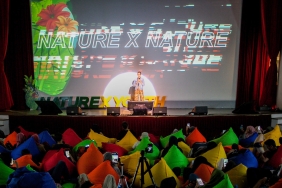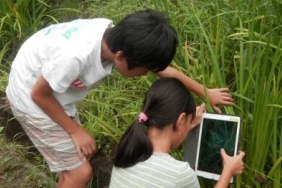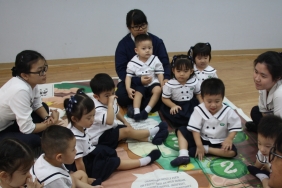THE JOURNEY OF EDUCATION FOR SUSTAINABLE DEVELOPMENT IN INDONESIA FROM AN SSM PERSPECTIVE
The Republic of Indonesia is one of the most populous countries in the world with a population of 235 million (2013). Its size, which includes both land and sea, also places it in the top 20 largest countries in the world.
Indonesia's landscape consisting of sea, islands, islands and mountains, in the process of development and development from time to time produces many impacts. Some of these impacts are positive, but some have an impact on the inequality of life in most communities. This condition provides space for non-governmental organizations (NGOs) to play a role in the movement at the grassroots level for and from the community in order to achieve a better and sustainable livelihood.
In its long journey, a number of NGOs in several regions have established partnerships with the government in their respective regions and other related parties. In general, it can be said that the presence of NGOs in the community and government is accepted and recognized as providing positive results and impacts.
In the development and implementation of education for sustainable development (ESD) programs or also known by the original term Education for Sustainable Development (ESD), a number of stakeholders including civil organizations / non-governmental organizations also play an important role.
Towards the end of the Decade of ESD (2005 - 2014) as launched by UNESCO almost ten years ago, a number of ESD activists/NGO activists were moved to see how far ESD is known, understood, and implemented in Indonesia. The journey of ESD programs in Indonesia and assistance by NGOs needs to be recorded and documented as input and shared learning. This prompted the production of this "Journey of Education for Sustainable Development in Indonesia from an NGO Perspective". This report is intended as supporting information on ESD implementation in various forms and translation at the field level in a number of regions in Indonesia.
To collect supporting data for this report, in the second semester of 2012, several NGOs conducted Focus Group Discussions (FGDs) in seven cities with program partners consisting of teachers, principals, city or district education offices, environmental agencies, and other NGOs. At the national level, in December 2012 the Indonesian ESD Network and WWF Indonesia held an ESD Policy Workshop attended by 150 people who were representatives from the central to local governments, school principals as policy makers in schools, and a number of program partners. The ESD Policy Workshop became the starting point for the establishment of the Working Group: Socialization of Recommendations from the ESD Policy Workshop and the report "The Journey of Education for Sustainable Development in Indonesia from an NGO Perspective"
The status of ESD implementation and assessment in this report is based on the collection of ESD implementation practices (best practice) from 22 NGOs in 11 regions/provinces in Indonesia. Admittedly, data collection in this limited time and human resources cannot represent Indonesia as a whole. Nevertheless, it is hoped that the data collected can provide a big picture of ESD implementation in Indonesia. The preparation of this report contributes to the sustainability framework from the point of view and perspective of actors at the grassroots level in several regions in Indonesia.
Monitoring and Evaluation Report
Borneo is the third largest island in the world which is very famous for its natural resources such as forests, coal, gold and oil. Mario Rautner (2005) in his report on the status of Borneo's forests, wildlife and threats to them said that Borneo is a land of plenty or a land of many things, or in other words, a rich land. One of the threats Rautner refers to is the loss of biodiversity on the island year after year. For example, based on satellite monitoring data, the World Wide Fund for Nature (WWF) reports that 56% or approximately 29,000 kilometers of protected forest in Borneo has been cut down for oil palm plantations and land conversion (Rautner, 2005). In order to safeguard Borneo and ensure effective management of the island, in 2007 the three countries with territories on Borneo, namely Indonesia, Brunei Darussalam and Malaysia, signed an agreement to undertake positive activities to safeguard Borneo. The agreement is called Heart of Borneo (HoB).
In 2008 WWF followed up on the agreement through the development of the Education for Sustinable Development (ESD) or in Indonesian known as Education for Sustainable Development (ESD) program by conducting training and mentoring schools located in 10 districts in the HoB area, namely: Katingan, Murung Raya, Gunung Mas, West Kutai, Sintang, Melawi, North Barito, Kapuas Hulu, Nunukan and Malinau. In each district, a pilot school was built with the aim of making the WWF-Indonesia assisted school a center of learning for the surrounding community and other schools by instilling ESD values as part of saving national natural resources.
In 2008, WWF-Indonesia started the ESD program in 10 districts in the HoB-Kalimantan region.
There are 34 schools that are under the assistance of WWF-Indonesia. During the running period, the assisted schools have received assistance in the form of training for school quality improvement, and educational values for sustainable development. The ESD mentoring program in HoB is conducted through the implementation of The Whole School Approach. The whole school approach includes:
- School culture and ethos.
- Learning.
- Students.
- Community.
- School environment.
- Monitoring and evaluation.
The ESD mentoring program in HoB is conducted through the implementation of the whole school approach.
Surely there are many changes that occur in these schools. For this reason, an evaluation activity was carried out with the aim of obtaining information about the impact of school mentoring on:
- Learning in schools including integration of learning and ESD issues.
- Visible changes in the school and community.
- School plans after the mentoring period is over related to the sustainability of sustainable development education.
- Student development, which is not only related to aspects. learning. But more on how students appreciate. the diversity of their biology, social and culture, and of course the environmental issues around them.
- School development, which is not only related to learning aspects.
- The ability of teachers, principals and students to think critically about learning and issues in society.
- Participation and contribution of the community around the school (parents, local government, stakeholders, etc.) in school activities.
- School-developed plans and policies.
In addition, this activity is also expected to provide recommendations on the development of similar programs in the future and their relevance for improving the quality of schools in Indonesia.





